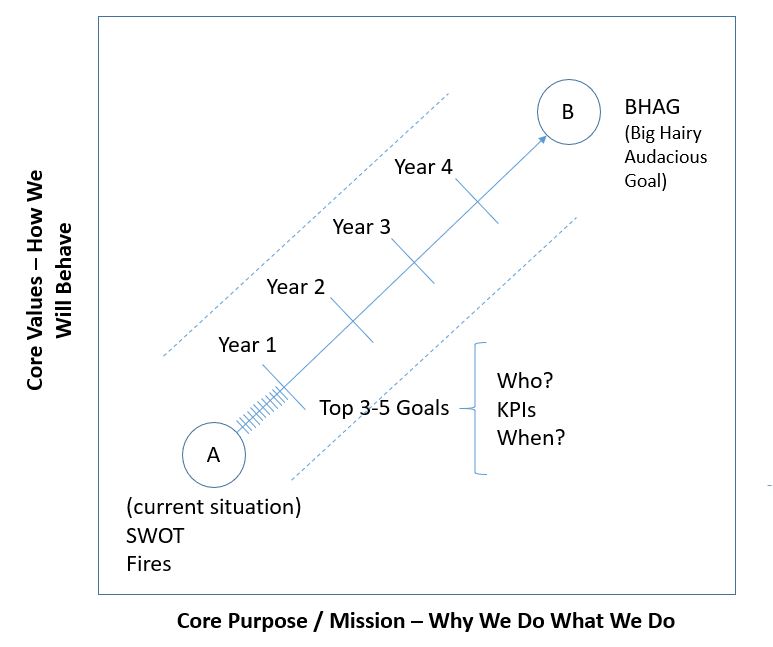Are you on track to crush your company goals this year? I don’t mean to just squeak by. I mean exceed the goals you’ve set for your company. Everyone wants to win right?
I am still amazed at the difficulty companies are having with their goals.
As Zig Ziglar used to say, “aim for nothing and you’ll hit it every time”.
According to Barney and Griffin, company goals serve four basic functions:
- Provide guidance and direction
- Facilitate planning
- Motivate and inspire employees
- Help evaluate and control performance
Goals help us define what we’re trying to accomplish. They define the target. Goals are the center of the bulls-eye. Once we know the goal, we can define the strategy of attaining the goal, which increases the likelihood of success.
Without individual goals, we would wander aimlessly through life. We teach our kids to have goals, to “dream big”. I want my children to live up to the true potential of what God created them to be. Goals help to give direction to our lives.
As important as goals are for us individually, I would say goals are exponentially more important for companies.
Properly set company goals help to define where leadership wants the company to go and ( probably more importantly) where they don’t want the company to go.
Company goals help to clarify the individual priorities of all the people employed by the company. Company goals help to direct all the valuable resources of the company. The clearer you can be about your goals, the more efficient you can be.
So I hope you can see why setting company goals is important.
I wanted to share the four things that ensure you crush your company goals.
Make Sure The Company Goals Get You Closer To Your Point “B”
It’s entirely possible that a company goal can fight against where you are trying to take the company long-term. Your “success” in the short-term could hurt your true success in the long-term.
If you take a look at the image below, you can see that your company’s core values and core mission are meant to constrain the company in its progress to the point “B” (where you are ultimately taking the company).
Think hard about your company goals and make sure they move you closer to your point “B”. If you’re not clear on your point “B”, take a look at this blog post on the subject.

Make Sure Your Company Goals Are Communicated To Everyone In Your Company
If you were to ask your management team to list the top 3-5 company goals, are you 100% confident they each would give the same answer?
If you’ve defined your company goals and every member of your management team cannot recite them, you have a communication problem. If your management team gives you different answers, you have an communication and alignment problem.
We suggest monthly review of your company goals as a great mechanism for ensuring everyone knows not only the goals, but also the progress on those goals.
We’ve developed a platform that allows you to enter your goals and view them in one easy to use interface.

Make Sure Your Company Goals Are Measurable So Everyone Knows What Success Looks Like
I was consulting with a $10M company recently and they were working through defining their goals.
The company had created a strategic plan which generated about 8-9 “goals”.
Unfortunately, there was no clarity around how success was measured for each goal.
I’ve written about the SMART goal framework before. In order for a goal to be effective, there needs to be utmost clarity around what success looks like.
If your goal is to “increase revenue”, then how will you know you achieved the goal?
You can see in the image above that each goal has an associated KPI (key performance indicator). I’ve written about KPIs before. A KPI is just a number that unambiguously tells you if a goal is achieved. Each KPI has a Target and Value. When goals are not measurable, the people responsible for that goal have no way of knowing if more effort or resources are required to achieve the goal.
Make Sure Someone Is Ultimately Responsible Each Company Goal
One of the biggest areas that drive goal achievement is accountability.
Someone (one person) must be ultimately accountable for each company goal.
Of course, certain goals take an entire team to accomplish. For example, customer satisfaction. This usually starts with sales setting the right expectation, then the product team delivering what the sales team sold, then following up with solid customer service. Virtually everyone in the company is responsible, but someone ultimately needs to take the lead. If not, you might as well not even set the goal since very little effort will be expended to reach it – who will care?
I hope these four steps will help you to not only achieve your company goals, but crush them this year.